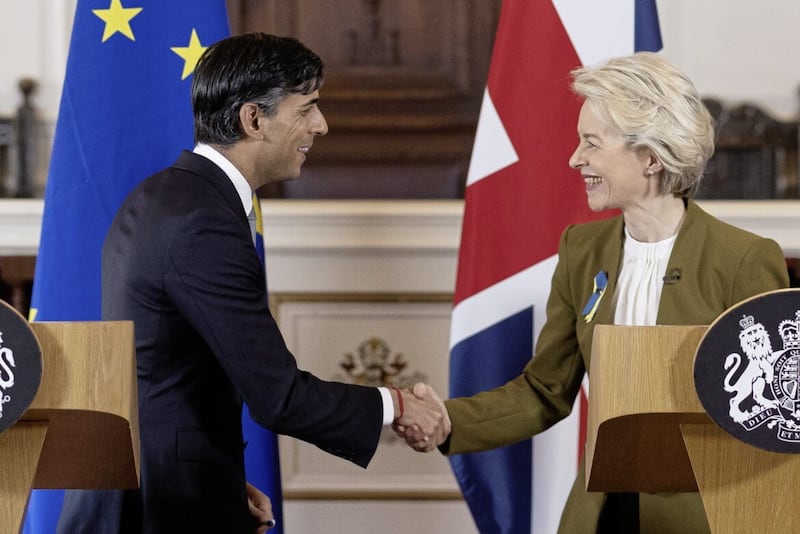In her inaugural speech as SDLP leader last Saturday, Claire Hanna cited rejoining the EU as a decisive attraction of a united Ireland.
Former Taoiseach Leo Varadkar said the same at an SDLP event the previous week.
This view appears to be universally held across nationalism and widely accepted beyond.
For Hanna and many others, it is a way to broaden out the debate on Irish unity beyond sterile ethnic binaries of victory and defeat, by offering everyone a win.
The hope for a better form of politics should be respected, but there may be problems with how much this route to the future depends on an imagined past.
The basic flaw with the nationalist rejoin argument is that few people cared about the EU when we were in it, so how deep a desire will they have to go back?

From accession in 1973 until the Brexit referendum, only the SDLP and Alliance were consistently enthusiastic about membership, with every other party either ambivalent or opposed. For most of the public it was simply a non-issue.
Of course, important things can be taken for granted and missed once they are gone, but that does not quite fit the SDLP’s case.
When John Hume spoke of a “post-nationalist” Europe, it caused his party great discomfort and he was ridiculed by Sinn Féin. Arguing beyond binaries did not unite nationalists and unionists – it just divided nationalists.
The next imagined period of history is Northern Ireland’s pre-Brexit golden age, an era apparently so acceptable to moderate nationalists that it rendered the union safe indefinitely.
If I were a nationalist, I would be extremely wary of cultivating this now-common myth.
There was a relatively stable period between the St Andrews Agreement and the 2012 flag protests, although Sinn Féin did not sign up to policing and justice until 2010. However, the remaining years prior to the EU referendum were a fiasco.
The flag protests brought disorder back to the streets, then Stormont ground to a halt for three years as Sinn Féin effectively went on strike over welfare reform; the party also began campaigning for a border poll from 2013, when Brexit was barely a twinkle in Nigel Farage’s eye.
The true golden age came under the 2016 DUP and Sinn Féin executive, which lasted eight months before it was brought down by the Renewable Heat Incentive. It was not brought down by the EU referendum, which occurred in its second month.

Both executive parties (or at least their civil servants) managed to issue a joint position on Brexit. It was the agreement of the ‘backstop’ a year later by London, Dublin and Brussels that started Northern Ireland’s Brexit crisis. Varadkar was taoiseach when this occurred.
The next fantasy epoch was the post-Brexit growth in support for a united Ireland, through the energising effect on moderate nationalists and other centrists.
In reality, the dial has barely shifted on electoral support for nationalism and opinion poll support for unification. Although unionist parties have lost support, that is only a win for nationalism under the binary view.
Alliance has grown but that was a reaction to the collapse of Stormont, not to Brexit. The 2019 Alliance surge has led to the contradictory perception that Brexit polarised Northern Ireland while also growing the centre ground.
What actually happened in 2019 was tri-polarisation. Research by Queen’s University Belfast and Ulster University shows the number of people describing themselves as neither unionist nor nationalist dropped to the lowest level in 15 years. Orange and green views hardened, yet the people left in the shrinking centre were aggravated as well and came out to vote in unprecedented numbers.
Brexit may have annoyed everyone but there is scant evidence it converted anyone. That is largely where the issue remains.

The Brexit binary in Northern Ireland is generally seen as a nationalist win and a unionist loss, due to the sea border and other requirements of the Windsor Framework. So nationalists should be less energised by Brexit over time, while unionist frustrations are unlikely to manifest as a yearning to rejoin that overpowers their British identity.
Such unionists exist but I suspect my view is more common – although I voted remain, any fondness I had for the ruthless EU is long gone.
Nationalism’s Brexit mythology could still succeed in rewriting history and creating its own reality. That would hardly be unprecedented.
We could as easily return to the historical mean, where Brexit becomes incidental to our quarrel.
Brexit may have annoyed everyone but there is scant evidence it converted anyone. That is largely where the issue remains



